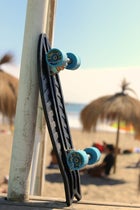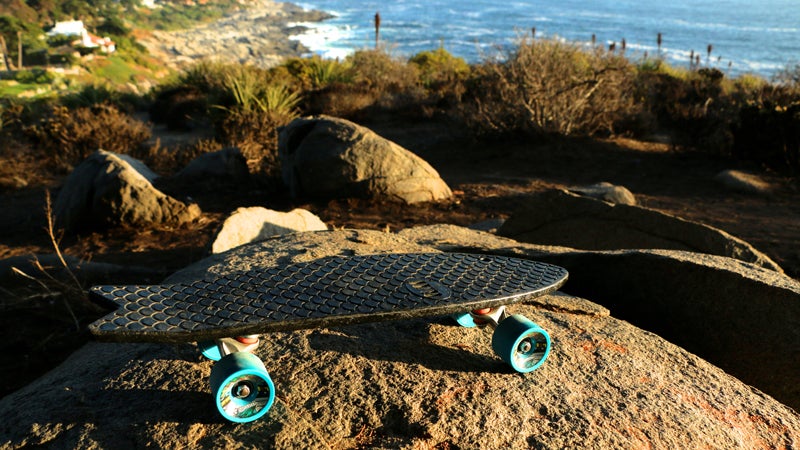If marine pollution had a fantasy league, discarded fishing nets would be a red-hot draft pick. It’s hard to imagine anything more harmful to aquatic wildlife than a sprawling plastic lattice that approaches invisibly and never stops killing. According to the Marine Mammal Center, a global organization dedicated to marine conservation, so-called , tangling millions of birds, fish, turtles, and crustaceans every year.
 The Minnow
The MinnowA is working on a solution—that rolls. Founded by three American engineers who share a passion for sustainability and skateboarding, the Santiago-based company has pioneered a process that turns derelict fishing nets into ready-to-ride cruiser boards. The first model has a fishtail shape, fish-scale grip and is named (what else?) “The Minnow.”
“It started with trying to establish collection points in costal towns around Chile, but then we realized how durable these materials are,” explains Bureo cofounder Ben Kneppers. “We thought, ‘What if we can upcycle these into something cool?’”
It didn’t take long to settle on skateboards as the ideal product, but no one knew if it was actually doable. First they needed a steady supply of raw materials, so they partnered with local fishing syndicates and built free disposal bins in coastal locations around Santiago.
“It started with trying to establish collection points in costal towns around Chile, but then we realized how durable these materials are. We thought, ‘What if we can upcycle these into something cool?’”
Minimizing their carbon footprint was also important, so the donated nets were transported via deadhead freight (trucks returning with otherwise empty loads) to a recycling and manufacturing facility in Santiago. Then came the hard part: shredding, pelletizing and injection-molding the nets into skateboard decks and rigorously testing them for safety.
“It’s pretty new territory,” says Kneppers. “I don’t think the people at the plastics facility thought we were serious until we showed up with 600 pounds of old nets.”
The manufacturing process went, in a word, swimmingly. Completed boards will be shipped from Chile to California via eco-friendly ocean freight to be fitted with components like Sartori Eco-Cruiser wheels, constructed with 30 percent vegetable oil and 100 percent recycled cores. Meanwhile, Bureo has secured initial funding from the government-sponsored organization and Northeastern University’s , and they are launching a Kickstarter campaign in mid-April.
“Riding our first prototype was a trip,” says Kneppers, who later convinced folk musician and environmentalist Jack Johnson to climb onto a Minnow after performing at a sustainability event in Santiago. “When he started skating on our board for the Chilean press that was our ‘holy shit’ moment right there.”


